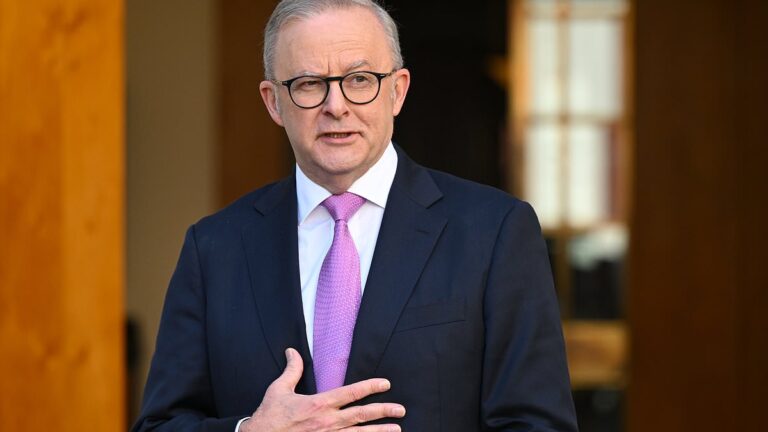Federal MPs elected before 2004 and judges will be exempt from Labor’s plan to double superannuation taxes until legislation design flaws are fixed.
Unlike most Australian workers, Anthony Albanese and new Liberal leader Sussan Ley are on a defined benefits superannuation scheme where retirement benefits are guaranteed – as are judges, state MPs and many public servants.
Labor wants to double earnings taxes on super balances above $3million to 30 per cent, but for the time being that will only apply to Australians who have accumulated super where the balance fluctuates with financial markets.
The government is also proposing a new 15 per cent on unrealised gains tax above $3million, which would see a capital gains tax applied to super on the notional value of assets.
This plan, known as tax division 296, would force Australians with a self-managed super fund to sell assets like real estate to avoid having to pay the tax.
AMP deputy chief economist Diana Mousina and CPA Australia’s superannuation lead Richard Webb have argued Labor’s plan to tax super balances above $3million, without indexing it for inflation, would affect way more than the 80,000 people Labor is citing.
Ms Mousina said the average 22-year-old worker would be affected in four decades’ time but Liberal MP Tim Wilson said Labor’s tax plan was likely to hit many Australians now under 40 once they retire.
‘Anyone who thinks that the family savings tax isn’t coming for them is wrong,’ he told Daily Mail Australia.
‘Everyone under the age of 40 is going to be hit and hit hard, particularly if they do well.’

Federal MPs elected before 2004 and judges would be exempt from Labor’s plan to double superannuation taxes until design flaws are fixed (pictured is Prime Minister Anthony Albanese)
Wilson warned Labor’s plan to tax unrealised gains on super opens a Pandora’s Box in which the government will look to tax other unrealised gains, such as the value of the family home.
‘They will replicate it on to other asset classes and they’ll be coming after your property, your small business and possibly even your family home,’ he said.
‘Once you create the legal framework, it will be shifted on to properties, on to trusts – it’s a slippery slope.’
Federal MPs elected before 2004 have their super in a defined benefits scheme making them exempt, with this small cohort also including Foreign Minister Penny Wong, Transport Minister Catherine King and independent MP Bob Katter, along with recently retired Labor MPs Brendan O’Connor and Maria Vamvakinou.
Wilson, who is leading the fight again Labor’s superannuation tax as the Opposition decides on a new shadow treasurer, said it was hypocritical to only tax super in accumulated savings accounts.
‘When the Prime Minister designs a family savings tax that exempts his super but nobody else’s – it shows a gross hypocrisy, that standard that’s being applied,’ he said. ‘There’s a standard for we but not for thee.’
But Treasurer Jim Chalmers argued Labor’s new proposed taxes on super would ultimately apply to defined benefit schemes too.
‘The actuarial calculation is similar to the calculation that currently applies to the changes that the Coalition made when they were in office,’ he told reporters in Brisbane.

That’s because unlike most Australian workers, Anthony Albanese and new Liberal leader Sussan Ley are on a defined benefits superannuation scheme where retirement benefits are guaranteed – with recipients also including judges (NSW judiciary pictured), state MPs and many public servants
‘There’s a formula which is calculated by actuaries and applied by the tax office in a way that is not inconsistent with the way it’s currently calculated for some of the changes that my (Liberal) predecessor made.’
Applying the tax to a defined benefits scheme would require finetuning of the bills first introduced in 2023 that the Senate last year declined to pass.
A Parliament House bills summary noted the inconsistency in how the law would affect different types of super schemes was the basis for the rejection.
‘Additionally, the proposed new tax affects individuals differently, depending on their ability to change their financial arrangements,’ it said.
‘Several factors influence this, including whether an individual is in the retirement or accumulation phase, the liquidity of assets held in superannuation, and whether an individual is in a defined benefit scheme.’

Liberal MP Tim Wilson, who is leading the fight again Labor’s superannuation tax as the Opposition decides on a new shadow treasurer, said it was hypocritical to only tax super in accumulated savings accounts
A Treasury paper last year noted Labor was developing a policy to have the tax applied to defined benefit super schemes, but this issue was unresolved.
‘It is the government’s intent to ensure broadly commensurate treatment for defined benefit interests,’ it said.
‘Treasury will consult further on the appropriate treatment for defined benefit interests.’
Labor could get its superannuation tax plan through the Senate with support from the Greens, who want the threshold reduced to $2million but with indexation.
Parliament is not expected to sit again until July but the Treasury Laws Amendment (Better Targeted Superannuation Concessions and Other Measures) Bill 2023 and the Superannuation (Better Targeted Superannuation Concessions) Imposition Bill 2023 could be backdated to July 1, 2025.

